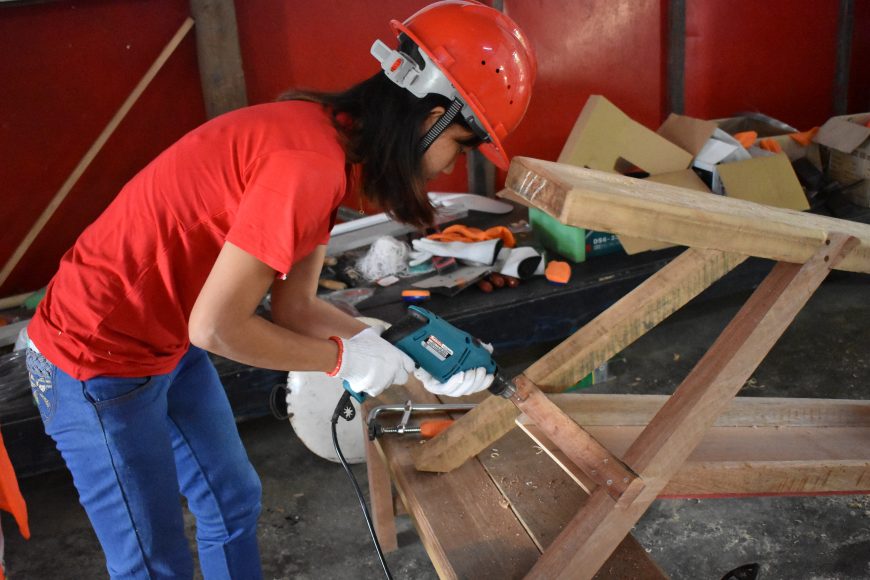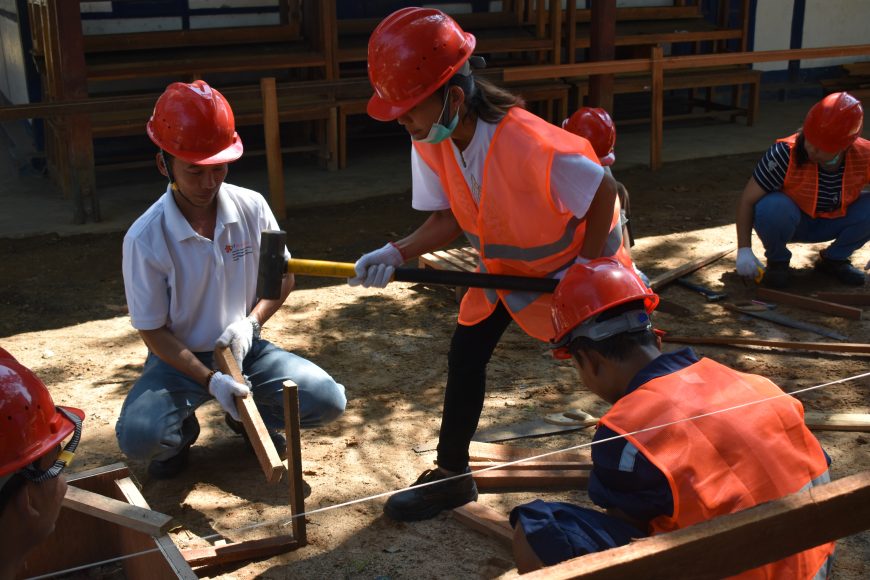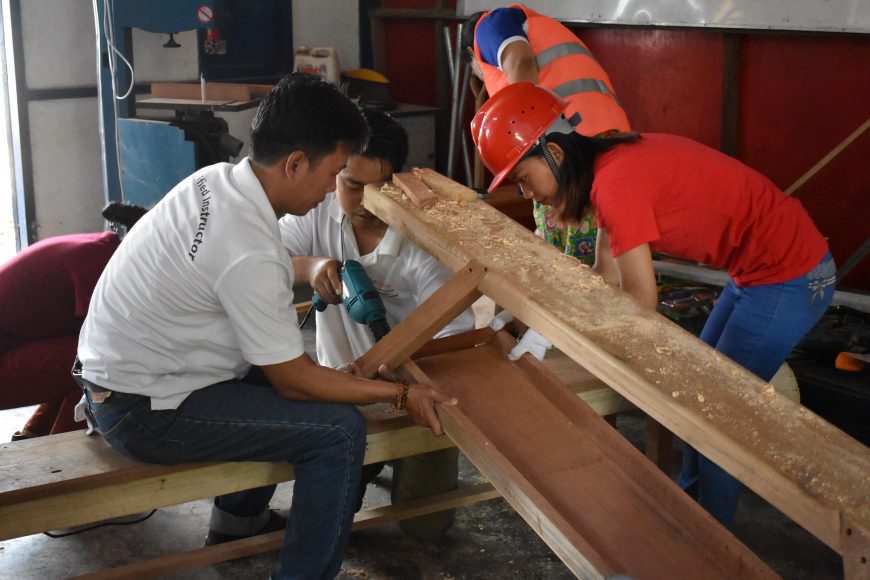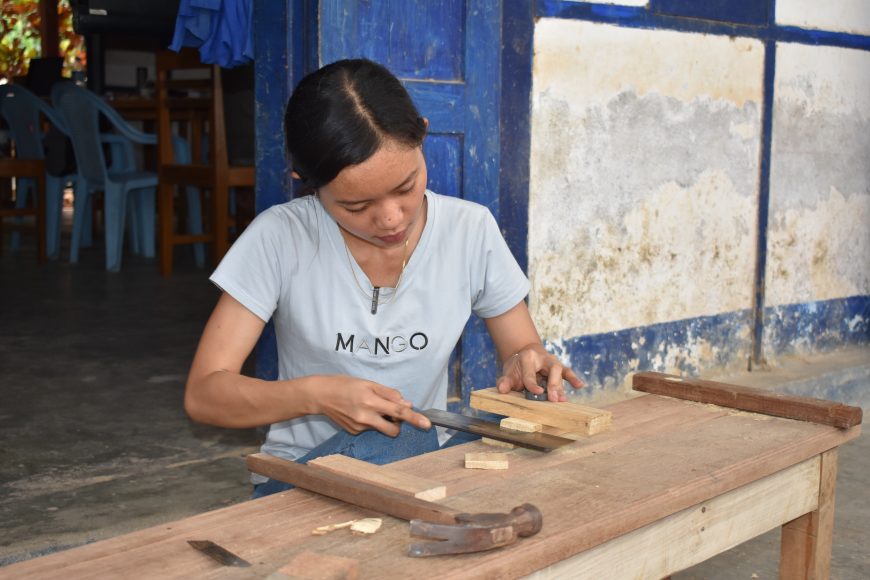When one pictures a construction worker or a carpenter, the first thought for many is that this person is going to be male.
Aye, 21, from the Tanintharyi Region in southern Myanmar is an exception. She, as one of ACTED’s most recent female construction graduates, now has a positive alternative to illegal migration which is often seen as the only possible paths for young people in the region.

Aye, like many others, was forced to drop-out of her education to earn a living, and has since struggled to find steady employment.
In the Tanintharyi Region, the number of unemployed youth aged 18-25 years old is twice as high as for those in higher age ranges. This pushes this demographic to migrate illegally to neighbouring countries in the hopes of finding employment opportunities through which they can support their families. Illegal migration is far from a safe option and young migrants put themselves at great risk of rights violations, exploitation, and criminal prosecution.
In response to this worrying pattern, ACTED has in collaboration with private companies and the French Development Agency (AFD) developed three different two-month vocational training courses focused on construction, mechanics and computer skills, aimed at supporting youth from Myanmar in securing a sustainable livelihood for themselves within their country of birth.

If something is broken, fix it
Aye lives with her family in a small village two hours from Dawei, the capital of Tanintharyi. Her father passed away when she was 16, forcing her to leave school to help take care of her younger sister while her mother worked.
Aye has always had a passion for building and construction and now helps her mother fix things around the house. When her village leader told her about ACTED’s construction training, Aye was fast to take the opportunity to enrol.
Vocational training courses are currently available at the local high school, however, it is a requirement that participants have completed either primary or secondary school education to enrol, which Aye never did. This is not a requirement in ACTED’s developed training courses.

Getting a second chance
It was a day for big celebration when Aye got accepted into the training course; “I remember my village leader came to my house to tell me that I was accepted in the project, I just started jumping up and down in happiness.” In the coming days, Aye realized how exceptional it still is for a girl, to want to work within construction and carpentry. She says, “Some of the neighbors made fun of me for wanting to take a training course that is not conventional for a girl.”
But Aye was determined and would not let anyone take the opportunity away from her. As she says: “I do not differentiate between a man’s and a woman’s work, we are all human beings and have different strengths and weaknesses. I have to go far in life, I have to take care of my family and myself. ACTED has allowed me to do this and with work that I love to do. I must use this opportunity at any cost.”
A man’s world
Despite her interest and determination, Aye found the beginning of the training very challenging. “At first, I was frustrated when I tried to use some of the tools. I didn’t have the strength to press and lift some equipment. It was hard, especially as boys in my class would come and laugh at me. They’d say that this type of work was only for men not women. It made me sad, but because I had not finished school, and I knew where I wanted to be, I worked hard to complete the training sessions.”
“Although it would have been easier to sign-up for the computer class together with all the other girls, I picked construction because few women work in this sector. I wanted people to be surprised when they saw what I could do. I wanted to use this opportunity to get more orders and show all the girls in my village that they can do anything they want to in life,” said Aye.

“Proving the world wrong”
Aye said that the ACTED construction training has given her a substantial insight into construction work with a good balance between theory and practical sessions. She is confident that she will be able to get a job. She said, “I am not sure it will be easy for me to get a job since I am a girl but with all the new skills I learned I am determined to show everyone that I am better than most men.”
Soon after completing the training, Aye offered to work voluntarily at a local construction site where a school is being built. Aye did this to develop her skills further and make sure that everyone in the village knows that she is reliable should they be looking to hire someone. At the time of writing Aye had been accepted as the first female volunteer at the site.
Towards the end of the interview Aye said “One day, I will have my own construction business only with girls. We have smaller hands which often is an advantage when making sure that everything looks good. We will show the whole village how skillful we are and make sure our families get a good life.”
Aye’s story is just one out of the 236 students ACTED has offered a chance to participate in the French Development Agency funded vocational training course in Tanintharyi. ACTED’s follow-ups with graduated students indicates that many of them are optimistic about their future and some have already gotten a job or hopes to continue their education. A common denominator for all the students ACTED has talked to, is that they now have the ambition and opportunity to build a brighter future for themselves. A privilege that many unskilled youths in Tanintharyi still cannot afford. ACTED hopes to continue support youth to create a livelihood for themselves even after project completion in May 2020.